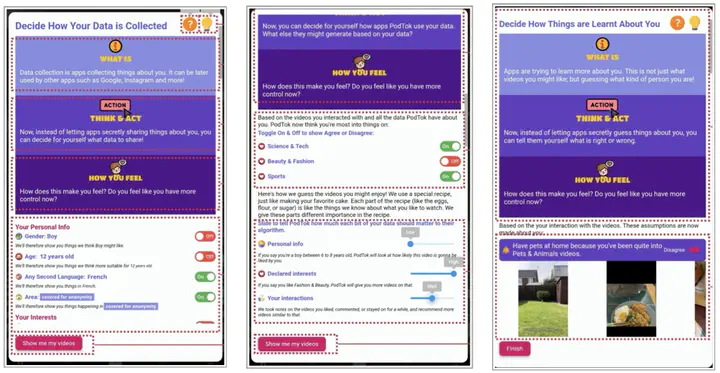CHAITok receives Honourable Mention (Best Paper) at CHI 2024

CHAITok – Empowering Children’s Data Autonomy in the Age of AI
In today’s digital age, social media has emerged as a dominant platform for children to socialise, entertain and educate themselves. As a result, it is not surprising that recent studies show that 38% of U.S. and 42% of UK kids aged 5-13 are using these platforms, despite the common age restriction of 13 for accessing these platforms.
Amidst the plethora of legislation discussions, a crucial concern often remains overlooked: the pervasive data harvesting practices that underpin social media platforms and their potential to undermine children’s autonomy.
This practice means that while they interact on social media, children produce vast data streams that platform owners can harvest, aggregate, and analyse. The resulting ‘insights’ are then used by platforms to predict and influence children’s personal attributes, behaviours, and preferences. This thereby shapes their online engagement and content choices, contributing to their increased dependence on these platforms.
The recent UK Online Safety Act is a pioneering movement addressing this outstanding challenge. However, currently, children have no easy way to gain transparency about how they are datafied or how they can exercise better data autonomy, reflecting their needs and rights.
CHAITok is an innovative Android mobile app that is designed to empower children with greater control and autonomy over their data on social media. Its interface is similar to TikTok. However, while children browse video recommendations, they have many opportunities to control what data is used by CHAITok and keep all their data safe (including interaction data, personal preferences, etc) in their own personal data store, powered by Solid.
CHAITok offers three distinctive features, including:
Respecting Children’s Values: CHAITok prioritizes the preservation of children’s values and preferences, by having carried out extensive co-design activities with 50 children to inform our design 1, ensuring that CHAITok reflects children’s values for having better autonomy and agency over their digital footprint.
Supporting Evolving Autonomy: Grounded upon our theoretical understanding of how children’s autonomy involves their cognitive, behavioural and emotional autonomy, and how their development of autonomy is an evolving process throughout childhood, CHAITok provides tools and resources for children to develop their sense of autonomy from multiple aspects, in an age-appropriate way, supporting their journey towards greater autonomy in navigating the digital landscape.
Actively foster autonomy instead of focusing on minimising harms: CHAITok advocates for children’s digital rights and emphasizes the importance of respecting their privacy and autonomy in online interactions. Unlike existing approaches, we took a proactive approach in our design, to explicit nudge, prompt, and scaffold child’s critical thinking, action taking and reflection.
Our 27 user study sessions involving 109 children aged 10–13 gave us a deep insight into children’s current experiences and perceptions of social media platforms:
- Almost all of these children feel a lack of autonomy (“don’t have autonomy at all”) over their data.
- One in three children found their experience with data on social media platforms as quite a passive experience, and often felt “being tricked” by these platforms.
- About a third found it hard to disengage from these platforms, and some even reported sleep issues when using phones before bedtime; and many of them felt “helpless” against resisting these platforms.
Through interacting with our app prototype as a group for about one hour at their schools, most children felt more safe, empowered, and respected. This provides encouraging results for our research, fostering children’s ability to overcome the feelings of lack of support and confidence.
Our results are in contrast to the common perception that children are incapable of making autonomous decisions. This provides critical inputs for us to reflect on the current ethics principles for creating AI technologies for children and an urgent need to further explore wider mechanisms to incorporate autonomy fostering in children’s digital life.
CHAITok is powered by the SOLID toolkit, a web-based personal data store that permits decentralised data control, and is part of the OMS EWADA programme. We look forward to continuing our exploration of how we may deploy CHAITok as an app in the wild, to provide an alternative social media experience for children, in a safer and more autonomy-respectful environment.
Please get in touch with us if you would like to know more about CHAITok and our research on Design for Children’s Autonomy.